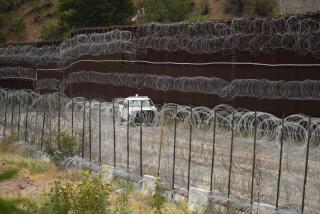Immigration, again
- Share via
ON THE immigration debate, President Bush is in much the same place he was a year ago. Not Yuma, Ariz., which he visited in May 2006 (and again on Monday) to extol the administration’s efforts to secure the border. Politically, the president is still trying to appease congressional hard-liners -- and he should be careful not to give too much away before debate begins.
Maybe Bush was engaging in some shrewd misdirection with his speech to Border Patrol and other law enforcement agents -- a speech in which he led off by emphasizing the need to “man your borders” and only then observed that “people are coming here to put food on the table, and they’re doing jobs Americans are not doing.” Maybe he was playing to his audience and to the members of Congress (Democrats as well as Republicans) who live in terror of being denounced as soft on “broken borders.” Maybe he sees the tough talk as a way to disarm opponents of balanced reform.
Still, his shift in emphasis was worrying. After a recitation of how the government was toughening up border security and a renewed proposal for a guest worker program, Bush said: “We’ve got to resolve the status of millions of illegal immigrants already here in the country. People who entered our country illegally should not be given amnesty.” He then offered a sketchy description of how those illegal immigrants could atone. “People who meet a reasonable number of conditions and pay a penalty of time and money should be able to apply for citizenship,” he said.
Yet if those penalties are so onerous that they keep illegal immigrants in the shadows, they’re counterproductive. There are other ways to create a “path to citizenship” that are realistic and fair, such as a legalization system that conditions citizenship on a continuous work record and the paying of a fine. That approach was the centerpiece of ill-fated proposals in the last Congress; the new Congress is talking about a “touchback” provision of making illegal immigrants leave the country first.
This may be a necessary price to pay for comprehensive immigration reform if the waiting period for reentry were brief. And it’s certainly true that charges of “amnesty” -- however misleading -- scare Democrats as much as Republicans. The danger is that once Congress sets out on a punitive course, anti-immigrant forces will lobby for lengthening the repatriation period and increasing the financial costs of legalization.
As Bush pointed out Monday, a lot has changed in a year. But the unfortunate reality is that the new Congress may be just as difficult to satisfy as the old one. The danger for Bush, then as now, is to concede too much to anti-immigrant partisans at the (re)start of this debate.
More to Read
Get the L.A. Times Politics newsletter
Deeply reported insights into legislation, politics and policy from Sacramento, Washington and beyond. In your inbox twice per week.
You may occasionally receive promotional content from the Los Angeles Times.









